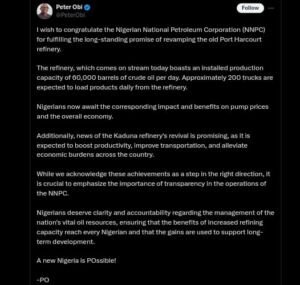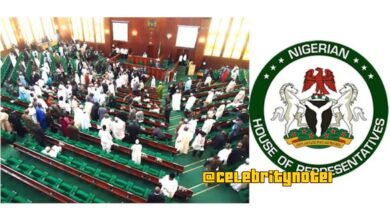Peter Obi Seeks Transparency as Port Harcourt Refinery Begins Production

Peter Obi, the presidential candidate of the Labour Party in Nigeria’s 2023 general elections, has called on the Nigerian National Petroleum Corporation Limited (NNPCL) to prioritize transparency and accountability as production commences at the newly refurbished Port Harcourt Refinery.
Obi, in a statement released to the press, expressed cautious optimism regarding the commencement of operations at the refinery, which has been a key part of the Nigerian government’s efforts to boost domestic refining capacity and reduce dependence on imported petroleum products. However, he emphasized that the true success of the project would depend not only on its operational effectiveness but also on how transparently the government and NNPCL manage its resources and output.

“The Port Harcourt Refinery is a significant project for Nigeria’s oil sector and the wider economy. But as always, the focus should not just be on whether the refinery produces oil, but also on how transparently its processes are carried out and how the revenues generated are managed for the benefit of the Nigerian people,” Obi stated.
Obi further noted that the refinery has the potential to help alleviate Nigeria’s perennial fuel supply challenges, but he cautioned that the government’s track record in managing such ventures has often been marred by inefficiencies, mismanagement, and corruption.
He urged NNPCL and other stakeholders to ensure that the operational details of the refinery, including the cost of repairs, the volume of production, and the pricing of refined products, are made accessible to the public.
The Port Harcourt Refinery, however, is expected to play a paramount role in addressing the country’s fuel scarcity issues by processing crude oil into refined products like petrol, diesel, and kerosene.
This development follows years of delays and budget overruns since the facility’s last major refurbishment project began in 2000.
Obi’s comments come as the Nigerian government continues to explore ways to overhaul its ailing oil sector, which has long been plagued by inefficiencies and corruption. In recent years, there have been calls from various quarters, including civil society groups, to ensure better governance in the oil and gas industry.









